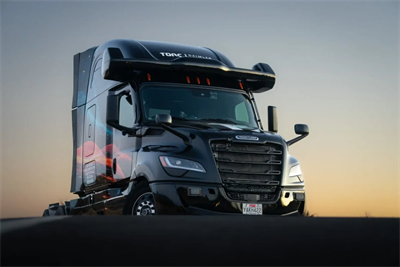Torc Robotics is building its autonomous trucking hub at AllianceTexas to serve as the firm’s testing grounds, customer experience center, and fleet management control. The location will serve as a hub for Torc’s plans to commercialize its technology in 2027.
Torc is a Virginia-based independent subsidiary of Daimler Truck AG, founded in 2005, focused on self-driving technology. It is led by CEO Peter Vaughan Schmidt. Alliance has long been known as a magnet for transportation and autonomous driving operations, with a multi-modal port, nearly endless warehouse square footage, and plenty of space to train and test self-driving technology.
Torc joins companies like Aurora, Clevon, Kodiak, and others that have worked with Alliance to launch and develop autonomous transportation products. Torc targeted DFW for its connection on I-35 to Laredo, which is the largest economic port of entry in the U.S. and represented $320 billion in total trade last year, amongst 15,000 truck crossings. The property at Alliance will be built out this year and include a 17-acre facility and 22,000 square feet of office space.
“We had been wanting to work with Torc for a long time, and we finally found a way to work together,” says Ian Kinne, director of logistics innovation at Hillwood. “They’re trying to hit the gas pedal and start commercializing this into a business, and we don’t want just to continue to be a place for testing. We want to be a place for innovators to commercialize their businesses.”
For Schmidt, Alliance met the company’s physical space and technology needs. “I was super impressed to see how many warehouses are up there, and the infrastructure is good for Class A trucking,” he says. “The quality of cable and fiber is important for us because we need to transfer a lot of data from our test hubs. It could be also a cool sandbox to try different operations models.”
Torc is currently in a transition phase as its operations hub moves from Albuquerque, New Mexico, to Alliance. Torc had 20 to 25 trucks in operation between Oklahoma City and Phoenix before the move. Torc is scrapping its old fleet as it prepares for commercialization and will launch a new fleet with the move to DFW. Rather than developmental, retro-fitted trucks, the new vehicles will be produced in the factory equipped with all the sensors and technology to operate without a human driver. The plan is to work with the parent company, Daimler, to create a scalable product rather than a hand-built, expensive truck that isn’t ready for mass distribution.
“If you order one truck, you get one. If you order 100, you will get 100,” Schmidt says. “It comes out of an assembly line and is a different quality than everything you see today.”
Schmidt noted that 70 percent of the Torc employees in Albuquerque decided to move to Dallas with the company, demonstrating the employees’ commitment to the mission of the company and DFW’s desirability as a place to live. With operations in Virginia, Michigan, Canada, and other locations, Torc’s trucks are built in Mexico, Cleveland, and North Carolina. Though it owns and operates the vehicles today, Torc doesn’t want to own the trucks when commercialization arrives. It intends to enable the Schneiders and JBLs of the world to do their business more efficiently. With demand for trucking increasing while driver supply dwindles, the technology is essential to the health of the American economy. “We want to win together. We want to progress together. We want to elevate the industry,” Schmidt says.
The move to Texas is all about commercialization. With friendly regulation, miles of highway, and a suitable and experienced partner in Alliance, Torc is poised for a commercial autonomous trucking explosion in 2027. Schmidt sees Torc’s differentiators in its scalability, return on investment, and pricing from the company’s experience in the industry. “We come from the industry and understand trucking well, and we have by far the best price points in terms of hardware and operations,” he says. “In the end, that’s what matters for a fleet. What is the cost of the truck that is autonomous ready? What’s the cost of their software subscription, and what are the other costs to operate it? We have a phenomenal product designed for scalability that will provide clients a payback of less than a year, which is unique.”
